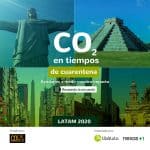Financial consultancy contract for the DecarBOOST project

Terms of Reference
| Project Name | Enabling conditions for investment in the transition to a low-carbon society in Latin American countries (DecarBoost) |
| Position | Financial Consulting for the DECARBOOST Peru Project |
| Location | Peru, under telework modality |
| Execution period | July - August 2021 |
| Contracting entity | DRAGONFLY COMMUNICATION, ENVIRONMENT AND DEVELOPMENT SAC |
| Responsible | Andrea Fonseca, Project Manager DecarBOOST Perú David García, Sector Specialist and Deputy Manager, C&D |
| Launching of the call for proposals | July 16, 2021 |
| About application | Send CV and financial proposal by July 22nd to [email protected] |
| Estimated consulting start date | July 26, 2021 |
| Type of contract | Consulting -4th category |
Background
The Nationally Determined Contributions (NDCs) submitted by Peru under the Paris Agreement are based on its national circumstances and interests. To move towards the implementation of the NDCs, it is crucial that favorable conditions are created to mobilize low-carbon and resilient investment to the impacts of climate change, avoid long-term investments that leave us "locked in" to unsustainable models, and achieve alignment with the long-term goal of keeping the temperature increase below 1.5°C. In this context, it is imperative to identify new policies, standards and measures that serve as the basis for establishing commitments and make them part of a mechanism to increase the ambition of the NDC based on competitive, sustainable and decarbonized investments.
Peru is at a crucial moment to avoid setbacks and accelerate the trend towards carbon neutrality and long-term resilience, as the infrastructure gap still requires large investments. In addition, the context of economic recovery in the face of the COVID 19 crisis also poses a challenge and an opportunity to rethink the way we continue to operate, as individuals, as companies and organizations, and as a country.
The project "Enabling Conditions for Investment in the Transition to a Low Carbon Society in Latin American Countries" (hereafter DECARBOOST project), is funded by the Federal Ministry of Environment, Nature Conservation and Nuclear Safety (BMU) and implemented by South South North, Libélula, New Climate Institute, Federal University of Rio de Janeiro/COPPE and the Torcuato di Tella Foundation. It aims to provide the evidence base for policy and standards reform, and to create the enabling conditions that will result in the rapid decarbonization of the economies of three Latin American countries (Peru, Brazil and Argentina) by making financial flows consistent with low-carbon development trajectories.
The project interacts with a range of public and private sector stakeholders through multi-stakeholder dialogues and strategic research, with the objective of facilitating increased mitigation and adaptation ambition, the provision of inputs for the design of effective financial instruments and the development of investment portfolios to advance NDC implementation in the target countries. The different stakeholder groups will benefit from the establishment of a Regional Community of Practice and national dialogues, where experiences, knowledge and climate investment opportunities are exchanged. Libélula is in charge of project implementation in Peru and knowledge management of the entire project at the Latin American and regional level.
The DecarBOOST project in Peru focuses on green recovery. Green recovery can be understood as a set of economic stimulus packages and recovery plans that create income, employment and growth opportunities and, at the same time, accelerate action on medium- and long-term environmental objectives, both nationally and globally. This seeks to significantly improve the resilience of economies and societies in the face of increasingly accelerated and challenging environmental challenges, in the specific case of Peru, focused on climate change. Furthermore, it is worth noting that putting people at the center of green recovery plans can lay the foundation for making the economy and society more resilient to future shocks.
In the case of Peru, there is no comprehensive Green Reactivation Plan in response to COVID-19, but there is an economic reactivation plan in response to COVID and, on the other hand, measures promoted by the Ministry of Environment to meet and increase the ambition of its climate commitments, which include new and reinforced measures around the NDCs.
Methodological approach
Two approaches are used for the development of the DecarBOOST project: top-down y bottom-up. The analysis top-down consists of analyzing measures that can be applied to mobilize climate action financing in Peru in the context of a green revival. On the other hand, through the bottom-up specific measures for climate action that are relevant in the context of green revitalization are analyzed in depth. Table 1 presents prioritized measures to be analyzed by the project through each of these approaches, and the rationale for their selection is explained below.
For the approach top-down it should be noted that most of the "Measures to put Peru on track" in the MEF's economic plan to address Covid-19 fit into one of the following categories:
- Measures that promote employment, for example through public investment projects.
- Measures that finance or promote private sector financing.
- Measures that promote purchases.
- Measures to boost public and private investment.
These measures of the MEF plan demonstrate how the State allocates its resources (public budget) in an emergency context and their analysis can be used to identify how green criteria could be incorporated to face the climate emergency. They also show the importance of private sector investment. Based on this, Table 2 proposes a preliminary set of prioritized measures that are considered relevant to "greening" public budget allocation and private investment. These measures can generate structural changes in the economy and are cross-cutting to sectors, so they can be considered as enabling conditions for climate action financing in Peru. It is important to emphasize, however, that unlike the specific measures of the bottom-up, These measures are still being analyzed in a general way, in order to later choose one in which to deepen the analysis.
For the approach bottom-up 2 specific measures were selected: teleworking and good practices in the provision and efficiency of electric energy in the private sector. In the case of telework, this measure was prioritized in coordination with the General Directorate of Climate Change and Desertification of MINAM, due to its potential to reduce emissions related to transportation. This is a new measure that is not yet part of the Peruvian NDCs, but was identified and prioritized by MINAM in its analysis of measures that contribute to green recovery. This measure was also prioritized because during the quarantine imposed by the pandemic many companies were forced to implement remote work, a work modality similar to teleworking. In this way, this kind of telework pilot, evidenced its benefits and the pending challenges to be overcome. Additionally, in 2019 telework had already been prioritized as one of the measures of the National Plan of Competitiveness and Productivity of Peru that contribute to the creation of conditions for a dynamic and competitive labor market for the generation of decent employment. The second measure seeks to identify and promote the scaling and replication of good practices of the private sector related to the NDCs of renewable energy and eco-efficiency. This measure seeks to involve the private sector to increase Peru's climate ambition and capitalize on the benefits of the energy sector in the context of a green recovery.
| Approach | Type of measures | Related categories of reactivation plan measures | Prioritized measures | ||
| Top-down | Structural or cross-cutting measures: That can generate structural changes in the economy and are transversal to sectors relevant to climate action. | Measures that finance or promote financing from the private sector Measures that finance or promote financing from the private sector | Carbon price Green criteria for investment and budget allocation | ||
| Bottom- up | Financial consulting for the DECARBOOST Peru Project | Measures that promote employment. Measures to boost public and private investment Measures to promote employment | Telework Private sector best practices related to renewable energy and eco-efficiency |
In addition to the 2 approaches, based on Libélula's previous experiences, the DecarBOOST project in Peru will be implemented taking into account 3 basic conditions:
- Credibility: actions related to the generation of high quality technical inputs. Through desk research and consultation with experts.
- Legitimacy: actions related to participatory processes with relevant stakeholders to gather knowledge and perceptions, and to validate the products developed in the project. Through surveys, multi-stakeholder dialogues and interviews. For the execution of these actions we work in partnership with relevant platforms and projects such as Nexos+1, LEDS LAC, Gestión CC, Peru 2021, among others.
- Relevance: actions related to the dissemination of information produced by the project to generate impact on the public agenda. Through allied media (web, social networks and newsletters) and national press, among others.
Objective of the service
Financial consulting for the DECARBOOST Peru Project during the project implementation period to incorporate .
Activities
The activities for the implementation phase are described below:
- Review and supplement project deliverables to include financial components or inputs and provide relevant comments in a structured manner.
- Participate in meetings and interviews, and review systematizations to ensure that key issues have been included.
- Elaborate the mapping of relevant stakeholders according to the products ordered, analyzing the roles and responsibilities of each stakeholder, and highlighting the barriers, investment opportunities, and enabling conditions identified by them. Taking into account the previously established taxonomy.
- Prepare products that demonstrate findings on arguments in favor of the measures, barriers and enabling conditions (proposed regulatory amendments, investment opportunities and financial instruments), according to project requirements and coordination with the consultant.
- Design and execute 2 inter-learning sessions (2 hours per session) with the project team to share knowledge on various economic and financial topics (e.g. basic concepts of budget and public investment, financial system, etc.).
- Leadership from the DecarBoost project, accompaniment and strategic direction of the process of elaboration of the sustainability indicator for prioritization of projects within the framework of the PNIC (National Infrastructure Plan for Competitiveness).
- Supervise the consultant hired to provide technical support in the process of developing the environmental component of the sustainability indicator for project prioritization within the framework of the PNIC. Ensuring the usefulness of the findings in the framework of the project.
- Participate in coordination meetings with the DecarBoost project manager and/or the project team to review progress and adjust deliverables.
Type of products and activities
| Product | Description | Activity | Products already defined |
| Product review | Documents with incorporated contributions and comments (according to formats agreed upon for each document) | Review and supplement project deliverables, to include financial components or inputs, and provide relevant comments from structured manner | Annual Investment Report Review (NCI) Proposed taxonomy for the classification of financial actors. Financial instruments developed Review and validation of the report on the environmental component of the sustainability indicator for prioritizing NIP projects. |
| Stakeholder mapping | Participate in meetings and interviews, and review systematizations to ensure that key issues have been included. Elaborate the mapping of relevant stakeholders according to the products ordered, analyzing the roles and responsibilities of each stakeholder, and highlighting the barriers, investment opportunities, and enabling conditions identified by them. Taking into account the previously established taxonomy | Map of financial sector actors in Peru. Map of public investment stakeholders within the framework of the PNIC | |
| Analysis reports | Reports incorporating findings from desk research and interviews | Prepare products that demonstrate findings on arguments in favor of the measures, barriers and enabling conditions (proposals for regulatory amendments, investment opportunities and financial instruments), according to project requirements and coordination with the consultant. Leadership from the DecarBoost project, accompaniment and strategic direction of the process of elaboration of the sustainability indicator for prioritization of projects within the framework of the PNIC (National Infrastructure Plan for Competitiveness). Supervision of the consultant hired to provide technical support in the process of preparing the sustainability indicator for project prioritization within the framework of the PNIC. | Climate Finance Analysis Report on financial institutions: Current status of climate or green financing in Peruvian financial institutions Main barriers identified (according to established category) Available financial instruments with a focus on those that can be used for specific measures |
| Interlearning sessions | Presentation on subject matter and answering questions from team members. | Design and execute inter-learning sessions (2 hours per session) with the project team to share knowledge on various economic and financial topics (e.g. basic concepts of budget and public investment, financial system, etc.). | Basic concepts of the financial system (public and private) in Peru. How public resources are managed in Peru. Session on budget and public investment. |
| Others | As required | Participate in coordination meetings with the DecarBoost project manager and/or the project team to review progress and adjust deliverables. | As required |
Deliverables
- Annual Report on Investments (NCI) with commentary
- Climate Finance Analysis Report on financial institutions:
- Current status of climate or green financing in Peruvian financial institutions
- Main barriers identified (according to established category)
- Available financial instruments with a focus on those that can be used for specific measures
- Presentation: Basic concepts of the financial system (public and private) in Peru.
- Presentation: How public resources are managed in Peru. Session on budget and public investment.
- Validated document of the progress report on the environmental component of the sustainability indicator for prioritizing NIP projects.
- Map of financial sector players in Peru
Qualifications and Experience
- At least 8 years of relevant work experience
- Experience in technical coordination of teams on climate change issues.
- Knowledge and experience in climate finance.
- Ability to manage coordination of diverse issues and with various stakeholders, both at technical/administrative and political levels.
- Excellent oral and written communication skills.
- Fluent oral and written English





